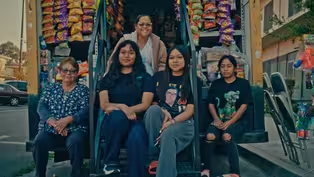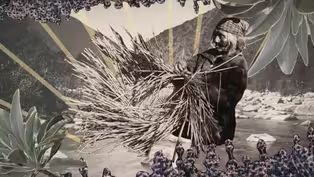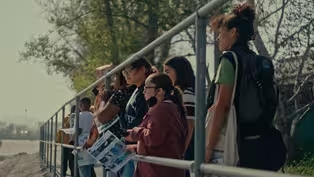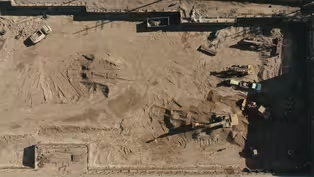
Green Gentrification in Elysian Valley
Clip: Season 5 Episode 2 | 4m 55sVideo has Closed Captions
The rebranding of Elysian Valley as a green space is pricing out many longtime residents.
Dario Herrera has been an Elysian Valley resident his entire life. He has watched housing prices pushing many of his family members out of the Northeast Los Angeles neighborhood along the L.A. River that newcomers are calling "Frogtown." Clockshop's Julia Meltzer attributes changes to a combination of anticipated green space along the L.A. River, the 2008 financial crisis and the pandemic.
Problems playing video? | Closed Captioning Feedback
Problems playing video? | Closed Captioning Feedback
Earth Focus is a local public television program presented by PBS SoCal

Green Gentrification in Elysian Valley
Clip: Season 5 Episode 2 | 4m 55sVideo has Closed Captions
Dario Herrera has been an Elysian Valley resident his entire life. He has watched housing prices pushing many of his family members out of the Northeast Los Angeles neighborhood along the L.A. River that newcomers are calling "Frogtown." Clockshop's Julia Meltzer attributes changes to a combination of anticipated green space along the L.A. River, the 2008 financial crisis and the pandemic.
Problems playing video? | Closed Captioning Feedback
How to Watch Earth Focus
Earth Focus is available to stream on pbs.org and the free PBS App, available on iPhone, Apple TV, Android TV, Android smartphones, Amazon Fire TV, Amazon Fire Tablet, Roku, Samsung Smart TV, and Vizio.
Providing Support for PBS.org
Learn Moreabout PBS online sponsorshipfor the residents of Elysian Valley, green gentrification isn't just a potential problem but something they've already experienced.
After a bike path and several parks opened a decade ago, real estate development skyrocketed, transforming the neighborhood in the process.
[Music] Dario Herrera: My name is Dario Herrera.
I'm 22, and I've been here for 22 years.
So my dad was the first one to actually come here, I think, in, like, 1985 or something like that.
So we've always had, like, a very familiar presence in the neighborhood.
You just knew everybody because they were all, like, your family, and you could just rely on everybody to help you.
I just think the river has become this commodity that developers, real estate people, politicians have tried to commodify.
And because of that, people that have lived here for so long can't enjoy what it's going to be in the future.
I think the one that's the most noticeable to me is, like, the absence of my family members that lived here, because they've just been pushed out of the neighborhood.
The price of living in this community has just gone really high up.
And so because of that, they've had to go to, like, other areas in, like, L.A. County.
And because of that--that whole, like, small town feel, it just collapsed basically.
[Music] Julia Meltzer: My name is Julia Meltzer.
I'm the founder of Clockshop and currently senior advisor.
Clockshop is a nonprofit organization that brings arts and cultural programing to public space in Los Angeles.
Since we came here in 2002 to this block, Clearwater Street, I've seen a lot of change, real estate speculation being the main driver.
And that has to do with generally just change in northeast L.A. and in Los Angeles in general, that real estate prices just go up and up.
I think it also has to do with the projected vision of green space in the neighborhood, which is at the end of our block, the L.A. River, and river revitalization fueling real estate speculation.
And the crash in 2008 and the pandemic contributed significantly to a changeover in ownership.
Dario: New businesses that have come to the community, their clientele is not the people who have lived here for a long time.
Maybe it's the people who have just moved here.
I just saw a menu for one of the businesses, and it was, like, avocado toast was, like, $13.
That's not something that people who are longtime residents want to eat or can afford, especially given the fact that there's no grocery store in Elysian Valley.
And a place where there's no access to food and the only access to food is, like, this high-priced, gentrified establishment, it's not really appealing.
And because of that, the community has had to respond to that lack of resources.
So Food Forward is one of those organizations, along with L.A.-Mas, that are bringing fresh produce and other, like, canned goods or, like, nonperishable items to these food-insecure communities.
I think there's, like, a divide.
There's two worlds.
I want to say, like, Frogtown is like a brand.
Elysian Valley is, like, the generic name.
And so the brand that they're trying to sell is, like, this luxury, like, hip enclave that is going to benefit those who have the means to frequent the establishments on the river.
The people who have lived here and who have had to deal with the changes aren't benefiting from those supposed benefits, right?
Julia: Yeah, I think neighborhood change and gentrification is very complicated and has been complicated here in Elysian Valley.
For example, the bike path is a space of a lot of contention in the neighborhood because it's been a walking path for a long time for a lot of people.
And when it was repaved, there was not space made for people who walk, and the people who are walking there are often senior citizens who live in this neighborhood.
And so there became, in a way, like, this battleground between bikers who are coming through the neighborhood and riding really fast.
A lot of senior citizens have said, like, "This space was taken away from me."
Dario: I like to avoid the bike path just because I don't like seeing the changes in the neighborhood, because I know it's real.
If I walk in the community, I still have some hope that things aren't going to change as drastically.
I'm reminded of, like, my childhood.
I'm reminded of, like, my past.
Julia: It's a little too late to be thinking about, How can we preserve the fabric of this neighborhood in advance of green space coming?
Because property values are already so high.
And you can't fault anybody for saying, like, "Oh, you know what?
I'm going to sell this place for 1.5 million, and I'm going to go to..." Idaho or Texas or wherever and get, like, three times the amount of space and a lot less headache.
And that's what's happening.
Chinatown's Shift from Affordable to Investment Destination
Video has Closed Captions
Clip: S5 Ep2 | 3m 33s | Chinatown residents wonder if the benefits of L.A. River restoration will pass them by. (3m 33s)
L.A. River's Legacy of Displacement
Video has Closed Captions
Clip: S5 Ep2 | 47s | For centuries, the L.A. river has shaped life for residents, while also displacing many. (47s)
Transforming the Los Angeles River (Preview)
Video has Closed Captions
Preview: S5 Ep2 | 30s | A transformed L.A. River is envisioned by the communities that live at its edge. (30s)
Unlikely Allies Fight for Affordable Housing Solutions Along the L.A. River
Clip: S5 Ep2 | 3m 8s | Unlikely allies join forces to add affordable housing solutions into the L.A. River Master Plan. (3m 8s)
Providing Support for PBS.org
Learn Moreabout PBS online sponsorshipSupport for PBS provided by:
Earth Focus is a local public television program presented by PBS SoCal



















